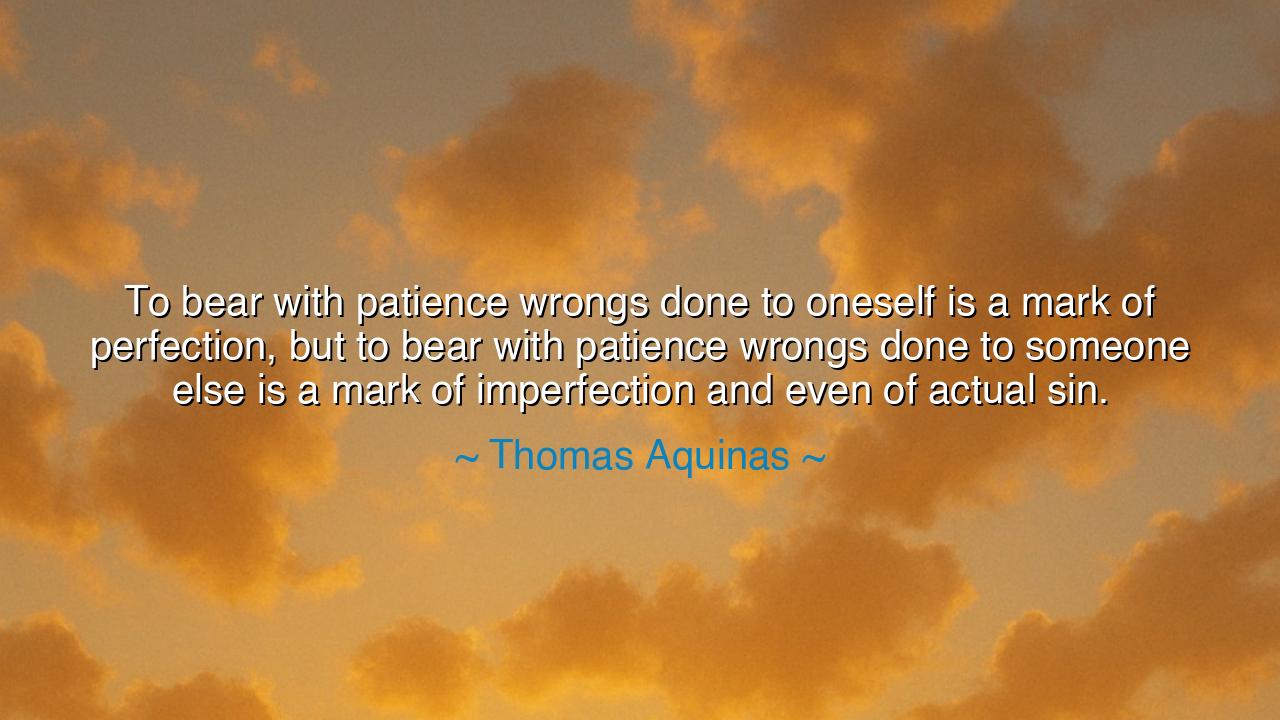
To bear with patience wrongs done to oneself is a mark of
To bear with patience wrongs done to oneself is a mark of perfection, but to bear with patience wrongs done to someone else is a mark of imperfection and even of actual sin.






The words of Thomas Aquinas—“To bear with patience wrongs done to oneself is a mark of perfection, but to bear with patience wrongs done to someone else is a mark of imperfection and even of actual sin”—strike like the voice of a prophet, carving out the difference between humility and cowardice, between holy endurance and shameful silence. Aquinas, master of reason and faith, here reminds us that patience, though a virtue, must be rightly ordered. To accept injury to oneself with quiet endurance is the sign of a soul tempered by humility; but to accept with equal quiet the injury of another is no virtue at all—it is betrayal.
The origin of this teaching lies in the Christian understanding of justice and charity. For Aquinas, the path to perfection is not found in self-exaltation, but in imitation of Christ, who bore the cross with infinite patience. To endure one’s own suffering without bitterness is to share in divine strength. Yet the same Christ who was silent under His own torment was fierce in defending the oppressed, rebuking the Pharisees, driving the money-changers from the temple, speaking for the voiceless. Thus, Aquinas declares: patience is holy when it restrains anger at personal wrong, but sinful when it excuses injustice against another.
Consider the story of Dietrich Bonhoeffer, the German pastor who lived during the shadow of the Nazi regime. He endured attacks on his faith and threats to his life with quiet patience. But when he saw others—Jews, the helpless, the voiceless—suffer violence, he could not remain silent. He joined the resistance, not because he lacked patience, but because patience in the face of others’ suffering would have been sin. Bonhoeffer’s martyrdom shines as an example of Aquinas’s teaching: bear wrongs against yourself with calm, but fight with courage when those wrongs are against your brother.
The impatient spirit strikes back at every personal insult, demanding vengeance at the smallest offense. This is pride, not virtue. True strength is the soul that can absorb insult, injury, and persecution without surrendering to hatred. This is the mark of perfection: patience toward one’s own wounds. Yet to stand idle when another is struck, to cloak indifference in the disguise of patience, is not perfection—it is cowardice. To call such silence a virtue is to allow evil to flourish. Aquinas calls this what it is: imperfection, even sin.
Thus, this teaching is both gentle and fiery. It counsels humility within oneself, but courage on behalf of others. It demands that the strong endure their own pain, but never tolerate the abuse of the weak. It tells us that patience and justice must walk hand in hand, each guarding the other, each preventing the excess of pride or the cowardice of silence. The soul must be meek when wronged, yet mighty when others suffer wrong.
The lesson for us is clear: cultivate patience in your own trials. When insulted, do not strike back. When wronged, endure with grace. But when the widow is robbed, when the child is abused, when the poor are oppressed, do not remain silent. To excuse the suffering of others in the name of patience is to twist virtue into vice. Your silence then becomes complicity, and your endurance becomes sin.
In practice, this means we must train our hearts in two ways: first, to endure with calmness the wrongs done to us, refusing the poison of revenge; second, to speak with courage when wrongs are inflicted on another, refusing the chains of fear. This balance requires wisdom, for the line between humility and cowardice is thin. But Aquinas gives us the guide: endure what is yours, defend what belongs to others.
So let his words be etched upon your spirit: to suffer one’s own injuries with patience is perfection; to suffer silently the injuries of others is sin. Be meek in your own wounds, but bold for the wounds of your neighbor. For in this balance lies the fullness of justice, the harmony of virtue, and the true path to perfection.






AAdministratorAdministrator
Welcome, honored guests. Please leave a comment, we will respond soon